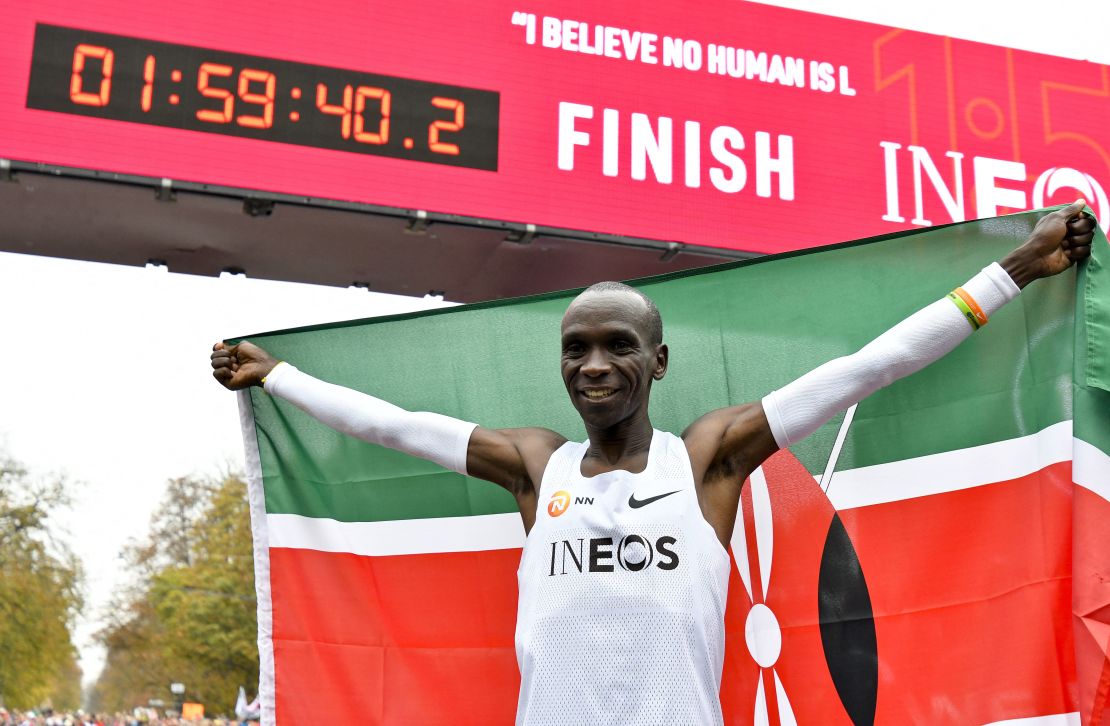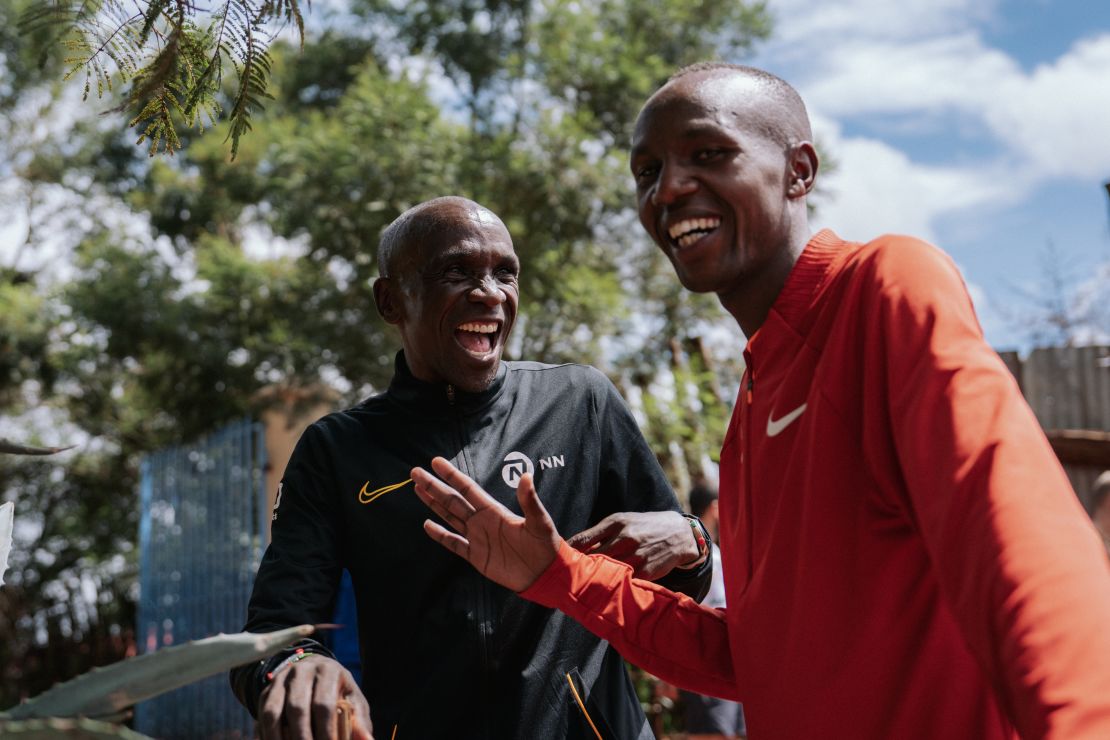Editor’s Note: This story is also part of an?interactive article about Kenya’s distance running superstars.
It’s 5:55am on a wet May morning in northern Kenya. The sun is yet to rise, but a group of runners emerge from a mud path onto the side of a road. They briefly pause, each tightening laces or adjusting a watch; then, without warning, the group sets off into the darkness at a blistering pace. Soon all evidence of them has disappeared, save for their shoe prints in the dirt.
This is what Olympic preparation looks like for arguably the greatest distance runner of all time, Eliud Kipchoge.
The run concludes 30 kilometers later, back where it began, at the training camp where the 39-year-old is gearing up for what could be his final bow on the Olympic stage. Kipchoge stands, once again, on the precipice of history, aiming to be the first person to secure three gold medals in one of the most iconic Olympic disciplines, the marathon.
Camp Kipchoge
The training camp set up by Kipchoge and his management team Global Sports Communication feels more to the tastes of Rocky Balboa than Ivan Drago. There are few modern comforts and little more than a small TV room and the company of their fellow athletes to keep the residents occupied.
“Discipline is sacrificial of personal pleasures,” Kipchoge tells CNN, reflecting on the daily routine that has shaped his adult life. “I always wake up at 5:45 in the morning, for the last 22 years, and that’s what discipline has meant to my mind.”
Perhaps the biggest sacrifice for Kipchoge is time spent away from his wife Grace and their three children when he’s in camp. “It’s really difficult, but all in all, Grace has adapted well … my family and kids are the reason I wake up in the morning, without them I would be a much lesser person,” Kipchoge told NNRunningTeam.com in a 2022 interview.
Kipchoge’s commitment and daily acts of discipline have been the bedrock of his success, building a mental strength that he believes is paramount in the marathon. “The mind is what drives the body,” he asserts. “If the driver is lazy and if the driver doesn’t have enough energy to drive you, then you cannot go anywhere.”
Kipchoge racks up around 200-220 kilometers in training every week. His schedule features track and road sessions, alongside a group of elite training partners, all under the watchful eye of his long-time coach, Patrick Sang.
The intense routine is fueled by a diet of traditional Kenyan food, including the fabled ugali, ?a carbohydrate made from maize flour and water.
For Kipchoge, recovery is just as crucial as training. “After a long run, I sometimes take an ice bath, then just relax for another two-and-a-half hours, have a massage, lunch, and an afternoon sleep,” he explains. With so much riding on Paris, life here has been stripped back to the basics.
Middle distance superstar Faith Kipyegon has trained alongside Kipchoge since 2019. “To be alongside Eliud every day and hearing what he’s saying about motivation and about the hard work we always put in, early in the morning, and going for a run together and just enjoying sport together, I think it has really changed my mind set and changed my goals,” she says.
History maker has eyes on Paris
Eliud Kipchoge is no stranger to rewriting history. In 2019, in Vienna, he shattered one of the most formidable barriers in sports by becoming the first person to run a marathon in under two hours. “Breaking the two-hour (mark) was great for me, in making history and telling the world that we are not limited at all in any barrier, in any profession.”

This achievement was a group effort, reflecting Kipchoge’s philosophy that running, traditionally seen as an individual sport, thrives on teamwork. “We had a great team in Vienna, from the technical team to athletes, coaches, and performance staff,” he says. “We bring our minds together, we think together, and we make history together.”
With the Games upon us, Kipchoge remains laser-focused on clinching his third consecutive gold medal in the marathon. “My goal is to win for the third time. My goal is still to run and inspire the next generation,” he says. This pursuit is not just about personal achievement but about demonstrating the power of longevity and dedication in sports.
For Kipchoge, the Olympics are also a platform for showcasing Kenyan excellence and promoting the country’s image globally. “Olympics is the soft spot to meet world leaders in sport and politics, and to sell our country,” he says, highlighting the broader impact of his participation. “This is the soft power, for us to tell people what’s inside Kenya.”
Historically, Kipchoge says, not enough has been done to leverage the positive image that Kenyan athletes are projecting around the globe. “After huge success in the Olympics, I think it’s high time for politicians to use the platform for development, to sell the country.”
After weeks of protests in the country, and with political and social tensions escalating, the Olympics could arrive at a crucial moment for Kenya, leveraging the unique power of sport to unite the nation.
A lasting impact

Eliud Kipchoge’s influence extends far beyond his sporting accolades. A deep thinker, he has addressed the Oxford Union, met with presidents and worked tirelessly to develop his foundation, which aims to give more children across the world access to education. His story is one of breaking boundaries, rewriting what we thought humanly possible.
Like many athletes coming towards the end of a glittering career, the question of how he will be remembered isn’t far from Kipchoge’s mind. His legacy, built on the foundations of discipline, teamwork and an unyielding pursuit of excellence, promises to endure long after he hangs up his running shoes. “I want to be remembered by making this world a running world,” he says. And through his unparalleled achievements, irrespective of the result in Paris, Eliud Kipchoge is well on his way to doing just that.





